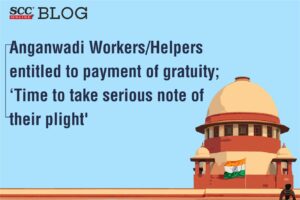Supreme Court: In a detailed judgment stressing on the importance of the work done by the Anganwadi workers/helpers at the grassroot level, the bench of Ajay Rastogi and Abhay S. Oka, JJ has held that Anganwadi workers/helpers are entitled to gratuity under the Payment of Gratuity Act, 1972.
Writing separate but concurrent opinions, both the judges agreed that the Anganwadi Workers/Helpers have been entrusted with the important tasks of providing food security to children in the age group of 6 months to 6 years, pregnant women as well as lactating mothers, apart from rendering pre¬school education. And for all this, they are being paid very meagre remuneration and paltry benefits.
The Court observed that it is high time that the Central Government and State Governments take serious note of the plight of Anganwadi Workers/Helpers who are expected to render such important services to the society.
Justice Oka wrote that the definition of ‘wages’ is very wide. It means all emoluments which are earned by an employee on duty. Thus, the honorarium paid to Anganwadi Workers/Helpers will also be covered by the definition of wages. As Anganwadi Workers/Helpers are employed by the State Government for wages in the establishments to which the 1972 Act applies, the AWWs and AWHs are employees within the meaning of the 1972 Act.
He also held that it was impossible to accept the contention that the job assigned to Anganwadi Workers/Helpers is a part-time job. It is full-time employment.
He added,
“the Government of India by a notification dated 3rd April 1997 has notified educational institutions as establishments under clause (c) of sub-section (3) of Section 1 of the 1972 Act. In the Anganwadi centres, the activity of running a preschool for the children in the age group of 3 to 6 years is being conducted. It is purely an educational activity. The job of teaching is done by Anganwadi Workers/Helpers. The State Government is running preschools in Anganwadi centres in accordance with Section 11 of the RTE Act. For the reasons recorded above, I have no manner of doubt that the Payment of Gratuity Act, 1972 will apply to Anganwadi centres and in turn to Anganwadi Workers/Helpers.”
Justice Ajay Rastogi observed,
“If we look towards the problems plaguing the Anganwadi workers/helpers, the first and foremost, they are not holders of civil posts due to which they are deprived of a regular salary and other benefits that are available to employees of the State. Instead of a salary, they get only a so called paltry ‘honorarium’ (much lower 24 than the minimum wages) on the specious ground that they are part-time voluntary workers, working only for about 4 hours a day.”
He, hence, observed that the time has come when the Central Government/State Governments has to collectively consider as to whether looking to the nature of work and exponential increase in the Anganwadi centers and to ensure quality in the delivery of services and community participation and calling upon Anganwadi workers/helpers to perform multiple tasks ranging from delivery of vital services to the effective convergence of various sectoral services, the existing working conditions of Anganwadi workers/helpers coupled with lack of job security which albeit results in lack of motivation to serve in disadvantaged areas with limited sensitivity towards the delivery of services to such underprivileged groups, still being the backbone of the scheme, time has come to find out modalities in providing better service conditions of the voiceless commensurate to the nature of job discharged by them.
[MANIBEN MAGANBHAI BHARIYA v. DISTRICT DEVELOPMENT OFFICER DAHOD, 2022 SCC OnLine SC 507, decided on 25.04.2022]
Judgment by: Justice Ajay Rastogi and Justice Abhay S. Oka
Counsels
For appellants: Senior Advocate Sanjay Parikh and P.V. Surendranath
For State of Gujarat: Advocate Aastha Mehta

